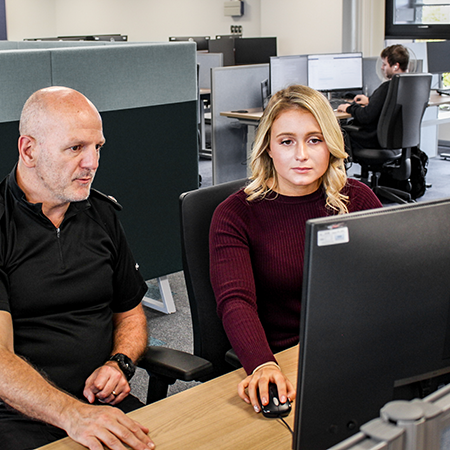Meet Rachel – Intelligence Analyst
How long have you been in your analyst role at Thames Valley Police, and can you explain what your typical day would look like?
I’ve been in an analyst role for three years at Thames Valley and have continued learning throughout it. A typical day for us varies greatly and really depends on the cases you’re assigned and working on. This is what I love about my job as no day is the same. Yes we use the same systems and look at the same types of data, but this can be for lots of different purposes.
Sometimes we are trying to find a missing person or tracking down a wanted person. Other days we spend getting evidential packs ready for court and supporting other departments or operations the best we can. However, at the end of each day I usually feel as though I have contributed something so that’s a really good feeling to finish the day on. I also spend a mixture of time working from the office and from home which really means I have a great work/life balance, as well as having all the support I need.
What sort of information do you work with, and how do you use that information within your role?
Analysts work with all kinds of data to best support live investigations and ongoing police operations. Personally, I mainly work with cellsite data which helps us locate and evidence a person’s use of their phone. However, we also work with ANPR, crime statistics, vehicle tracking data and downloads from devices. All of this data contributes either towards safely locating an individual that may need our help or ensuring that offenders are brought to justice within the court system. We also support a lot of live investigations with this data and recommend strategies that may help them move forward.
Can you give us an example of a project you’ve been part of, and how has your work contributed to it?

I have supported Reading Festival four times throughout my career as an Analyst in TVP which has been both exciting and a great development opportunity. TVP supports the entire Reading Festival operation to ensure that festival-goers can enjoy the event safely. As an Analyst I sit within the intelligence cell and support by using the skills I practice in my day to day work.
During the festival itself I update briefings for all the commanders and ensure that we have a handle on all crimes being reported during the Festival. This data is also fed into partners to help them understand any trends or hotspots of concern that may be emerging. I’m also available to assist with phone data and locating missing or vulnerable people, as well as helping with evidential products during fast time investigations whilst on site. After the event I collate everything that has happened and put it into a debrief product, providing recommendations and reflections for the next year.
What sort of challenges do you come across in your role, and how do you overcome them?
Sometimes looking at new types of data can be quite overwhelming, especially with the amount of information that can be downloaded from most electronic devices these days! However, I have a large team of experienced analysts close by that I can contact and ask for help if I come across something I haven’t dealt with before.
Sometimes a lot of our work can be very fast paced and high risk too, so I just have to remain calm and treat it like any other day. There’s always great opportunities to attend training and conferences as well which means I am equipped with as much knowledge as possible during more intense situations. This always helps me to move forward and support investigations the best I can.
What qualities (technical or personal) make a good analyst?
Good communication and literacy skills are essential. We do a lot of report writing and evidential products need to be made to a good standard. They also need to be understandable by everyone in a jury, so you always need to be able to decipher the audience you are communicating too and the kind of information they need.
Being good with IT systems and processing data is also very useful as that’s how most of our work is done. I would also say a good level of confidence helps as well; especially if you need to report your findings during briefings and large groups. Finally, I would say being creative and enjoying this area of work is important too it will keep you motivated on a day to day basis.
What would you say to someone that was considering an analyst role at TVP?
I would say get in contact with existing analysts and explain your current situation and why you would like to move into an analytical role. This will help you to further understand the work we do and if it’s something you can see yourself doing. If you’re already in the organisation, come and spend some time with us and we will always be happy to talk you through the things we do and systems we work with. If you like a good ITV drama I would also suggest watching Manhunt as that portrays the important work of an analyst within investigations quite well!
If you’re interested in helping to protect our communities by joining Thames Valley Police as an analyst, please take a look at our vacancies portal.


 Facebook
Facebook
 Twitter
Twitter
 Linkedin
Linkedin
 Instagram
Instagram